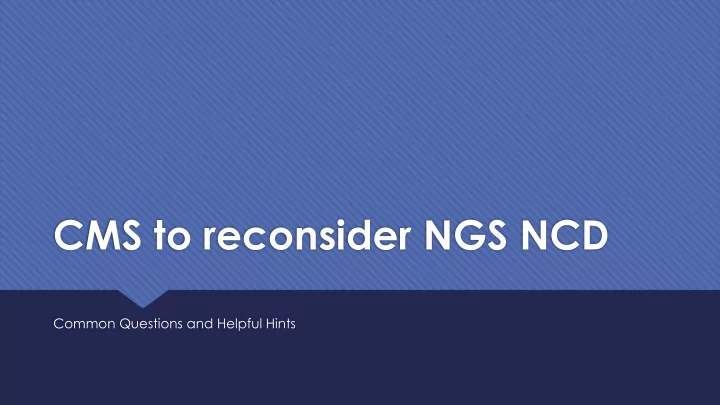

CMS to reconsider NGS NCD Common Questions and Helpful Hints
Policies within CMS Organizational Structure CMS CCSQ CM CAG QSOG HAPG DPCI DPER EDD DBO DAS
NCD Consideration and Reconsideration Formal 30 day 30 day Tracking Instructions Proposed Final Complete public public Sheet to Decision Decision Notification Implement Request comment comment
In the absence of a Formal Complete Request “To provide a complete picture of the cancer patient, a clinician may order both tests of somatic (cancer) and germline (inherited) mutations. It is important that tests detect these mutations accurately and produce valid results that are useful in guiding therapies to improve outcomes for patients with cancer. Therefore, CMS is internally opening this decision. ”
Public Comment Periods Solicitation of Public Comments Scope of Proposed Decision Interested in comments that include Patients: scientific evidence. recurrent, metastatic, or advanced cancer; not been previously tested using the same Requested comments that address the NGS test; breadth of the proposed decision. decided to seek further cancer treatment. NGS Tests: Provided questions in an effort to prompt FDA-approved substantive input from stakeholders. FDA-cleared CMS proposes non-coverage of NGS as a diagnostic laboratory test when patients do not have the above-noted indications for cancer or when the test does not meet the above-noted criteria.
Public Comment Periods Scope of Public Comments Scope of Final Decision Patients: After reviewing the public comments, the final NCD nationally covers any FDA approved or recurrent, relapsed, refractory, metastatic, or cleared in vitro companion diagnostic laboratory advanced stages III or IV cancer; not been previously tests using NGS only for certain patients (at this tested for the same cancer using the same NGS test; time there are 4 specific FDA approved decided to seek further cancer treatment. companion diagnostic tests using NGS). All other NGS Tests: diagnostic lab tests are at contractor discretion FDA-cleared or approved companion diagnostics. only if the patient criteria are met. Contractor Medicare Administrative Contractor discretion of discretion means that Medicare Administrative other NGS tests. Contractors will act on behalf of CMS to make reasonable and necessary determinations under Non-coverage of NGS as a diagnostic laboratory test when patients do not have the above-noted section 1862(a)(1)(A) of the Act, so long as indications for cancer or when the test does not specific limitations are satisfied. meet the above-noted criteria.
Public Comment Periods Expectations of Proposed Decision Scope of Tracking Sheet Public Comments It is important that tests detect these mutations accurately and produce valid 82 public comments submitted. results that are useful in guiding therapies to improve outcomes for patients with cancer. Discussed: Patient coverage criteria Specifically, we are only reconsidering Diagnostic test characteristics the evidence available for tests of germline mutations to identify those with Local coverage of MACs hereditary cancer who may benefit from Non-coverage targeted treatments based on results of Implementation and cost the test; all other tests are beyond the scope of this reconsideration.
Are the following Comments outside the First, we ask that CMS make clear that "advanced stage..." cancer is the same as "grade" of cancer scope of the NGS NCD and that there is no difference for purposes of Tracking Sheet? coverage between stage and grade. Evidence is building that establishes the value of multiple NGS tests throughout the duration of a patient’s treatment. Kim Long Kimberly.Long@cms.hhs.gov Tests for early stage cancer detection, repeated 410-786-5702 tests for disease monitoring, or new biomarkers, are non-covered and would require a re-opening of the NCD to obtain coverage.
NCD Consideration and Reconsideration Tracking Sheet Notification Public Comments Proposed Decision Feedback on Implementation Instructions Final Decision
CMS final CAR-T NCD Common Questions and Helpful Hints
Final NCD on CAR-T The Centers for Medicare & Medicaid Services (CMS) covers autologous treatment for cancer with T-cells expressing at least one chimeric antigen receptor (CAR) when administered at healthcare facilities enrolled in the FDA risk evaluation and mitigation strategies (REMS) and used for a medically accepted indication as defined at Social Security Act section 1861(t)(2) i.e., is used for either an FDA-approved indication (according to the FDA-approved label for that product), or for other uses when the product has been FDA-approved and the use is supported in one or more CMS-approved compendia. The use of non-FDA-approved autologous T-cells expressing at least one CAR is non- covered. Autologous treatment for cancer with T-cells expressing at least one CAR is non- covered when the requirements in Section A are not met. This policy continues coverage for routine costs in clinical trials that use CAR T-cell therapy as an investigational agent that meet the requirements listed in NCD 310.1.
CMS Reasoning for Final Decision CAR T-cell therapies continue to evolve as research and clinical trials are ongoing. We CMS is finalizing an NCD that provides for uniform national coverage. We also recognize that there is important ongoing research by scientists and manufacturers and note that the routine costs of clinical trials where CAR T-cell therapy is an investigational agent would be covered per our existing Clinical Trial Policy [NCD 310.1].
Coverage and Analysis Group DPCI DBO Janet Brock Michelle Atkinson Wanda Belle Leah Cromwell Patti Brocato Maria Ellis Linda Gousis John Manlove DPER EDD Lori Ashby David Dolan Andrew Ward Jim Rollins Beth Koller Rosemarie Hakim Sarah Fulton Joseph Hutter Xiufen Sui Kim Long Susan Miller Philip Connor Carl Li
Areas for Proactive Engagement Role of on-going Clinical Trials in Clinical Evidence Review Implementation Instructions for Medicare Administrative Contractors Appendix A: General Methodological Principles of Study Design Assessing Individual Studies Generalizability of Clinical Evidence to the Medicare Population Assessing the Relative Magnitude of Risks and Benefits
Recommend
More recommend